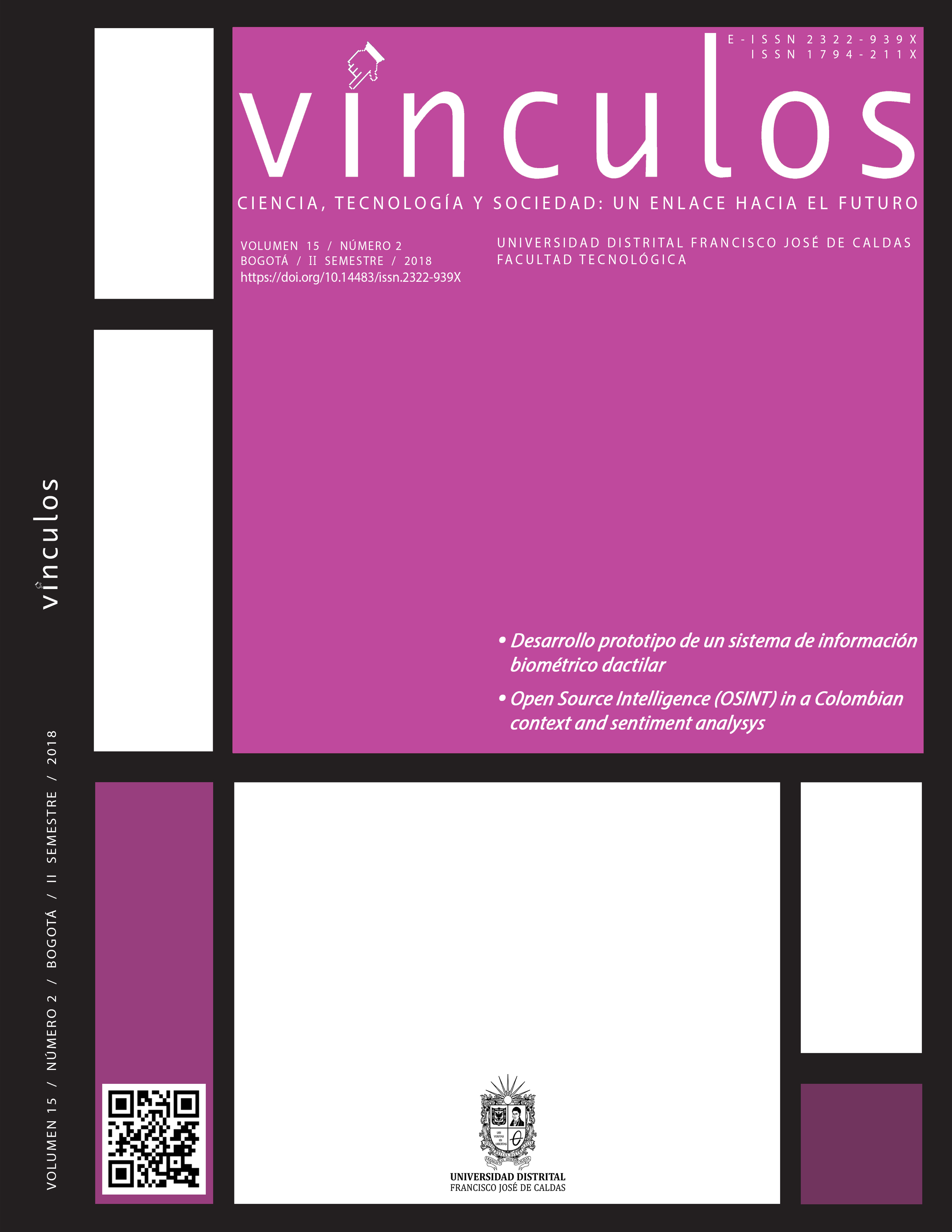DOI:
https://doi.org/10.14483/2322939X.13505Published:
2018-11-06Issue:
Vol. 15 No. 2 (2018)Section:
Technological presentMetodología para elaboración de requerimientos en aplicaciones con servicios web
Methodology for the elaboration of requirements in applications with web services
Keywords:
agile software development, requirements analysis, web services (en).Keywords:
análisis de requerimientos, desarrollo de software ágil, servicios web (es).Downloads
Abstract (es)
Dependiendo de la técnica usada en la captura de requerimientos, se pueden obtener procesos innovadores e iterativos que verdaderamente sirvan de soporte a la construcción de aplicaciones que consumen servicios. Las metodologías ágiles sugieren la elicitación de requerimientos altamente cambiantes, mientras que las metodologías tradicionales sugieren detallar al máximo los requerimientos luego de hacer un proceso de priorización. En el presente artículo se analizan los enfoques de elicitación de las metodologías ágiles y tradicionales y se toman los aspectos de cada una de ellas que guardan concordancia con las características de las aplicaciones que consumen servicios, lo anterior con el fin de proponer un marco de trabajo para la elicitación de requerimientos respecto al caso específico de aplicaciones que utilizan servicios web. Al finalizar el artículo se realiza una validación en dos empresas que prestan servicios de desarrollo de software.
Abstract (en)
Depending on the technique used in the capture of requirements, it is possible to obtain innovative and iterative processes that truly support the construction of applications that consume web services. In the present article the elicitation approaches of the agile and traditional software methodologies are analyzed and the aspects of the rules that guarantee the concordance with the characteristics of the applications that consume services are taken, with the purpose of proposing a framework of work for the elicitation of the information applied to the specific case of applications that use web services. At the end of the article, a validation will be carried out in two companies that provide software development services
References
M. Serna, “Analysis and selection to requirements elicitation techniques”, in 7th Colombian Computing Congress (CCC), Medellín, october, 2012, https://doi.org/10.1109/ColombianCC.2012.6398001
M. Muqeem y M. Beg, “Validation of requirement elicitation framework using finite state machine”, In International Conference on Control, Instrumentation, Communication and Computational Technologies (ICCICCT), Kanyakumari, july, 2014, https://doi.org/10.1109/ICCICCT.2014.6993145
C. Maines, B. Zhou, S. Tang y Q. Shi, “Towards a Framework for the Extension and Visualisation of Cyber Security Requirements in Modelling Languages”, In10th International Conference on Developments in eSystems Engineering (DeSE), Paris, june, 2017.
S. Nazir, “Why Quality? Iso 9126 Software Quality Metrics (Functionality) Support By Uml Suite”, ACM SIGSOFT Software Engineering Notes, vol. 30, n° 2, 2005.
Elsevier, “A decade of agile methodologies: towards explaining agile software development”, The Journal of Systems and Software, vol. 85, n° 6, 2012.
Z. Sultan, Rabiya, S. Nazir y S. Asim, “Analytical Review On Test Cases Prioritization Techniques: An Empirical Study”, International Journal Of Advanced Computer Science And Applications (IJACSA), vol. 8, n° 2, 2017.
M. Huo, J. Verner, L. Zhu y M. A. Babar, “Software quality and agile methods”, In 28th Annual International Computer Software and Applications Conference, Hong Kong, October, 2004.
L. Cao and B. Ramesh, “Agile requirements engineering practices: an empirical study”, IEEE Software, vol. 25, n° 1, pp. 60-67, 2008, https://doi.org/10.1109/MS.2008.1
A. Eberlein y J. C. Sampaio, “Agile requirements definition: a view from requirements engineering”, In Proceedings of the International Workshop on Requirement Engineering, 2002.
J. Karlsson y K. Ryan, “Prioritizing Requirements Using A Cost-Value Approach”, IEEE Software, vol. 14, n° 5, pp. 67–74, 1997, https://doi.org/10.1109/52.605933
A. Perini, A. Susi y P. Avesani, “A machine learning approach to software requirements prioritization”, IEEE Transactions on Software Engineering, vol. 39, n° 4, 2013, https://doi.org/10.1109/TSE.2012.52
V. N. Vithana, “Scrum requirements engineering practices and challenges in offshore software development”, International Journal of Computer Applications, vol. 116, n° 22, 2015.
C. Arias, G. Vilanova, M. Miranda, J. Fontana, S. Rivadeneira y D. Cruz, “Construcción de modelos de requerimientos a partir de modelos de procesos de negocio”. [En línea]. Disponible en: https://www.researchgate.net/publication/233529267_Construccion_de_Modelos_de_Requerimientos_a_partir_de_Modelos_de_Procesos_de_Negocio
N. Sharif, K. Zafar y W. Zyad, “Optimization of requirement prioritization using computational intelligence technique”, In International Conference On Robotics And Emerging Allied Technologies In Engineering (ICREATE), Islamabad, april, 2014,https://doi.org/10.1109/iCREATE.2014.6828370
F. L. Butt, S. N. Bhatti, S. Sarwar, A. M. Jadi y A. Saboor, “Optimized order of software testing techniques in agile process – A systematic approach”, International Journal of Advanced Computer Science and Applications (IJACSA), vol. 8, n° 1, 2017.
S. N. Bhatti, M. Usman y A. A. Jadi, “Validation to the requirement elicitation framework via metrics”, ACM SIGSOFT Software Engineering Notes, vol. 40, n° 5, September 2015, https://doi.org/10.1145/2815021.2815031
A. R. Asghar, A. Shah, A. Tabassum y S. N. Bhatti, “The impact of analytical assessment of requirements prioritization models: an empirical study”, International Journal of Advanced Computer Science and Applications (IJACSA), vol. 8, n° 2, 2017.
R. Thakurta, “A framework for prioritization of quality requirements for inclusion in a software project”, Software Quality Journal, vol. 21, n° 4, pp. 573-597, 2013, https://doi.org/10.1007/s11219-012-9188-5
A. Gross y J. Doerr, “What do software architects expect from requirements specifications? results of initial explorative studies”, In First IEEE International Workshop on the Twin Peaks of Requirements and Architecture (TwinPeaks),September,2012,https://doi.org/10.1109/TwinPeaks.2012.6344560
I. Sommerville y M. Alfonso, “Ingeniería del software”. Madrid: Pearson Educación, 2005.


3.png)



